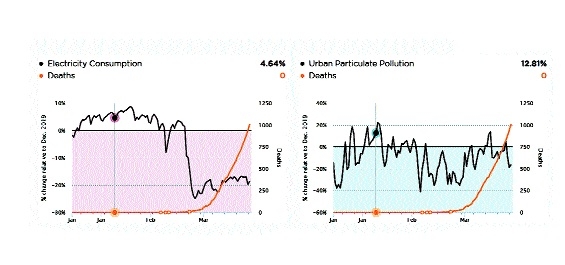Country’s urban particulate pollution dips further: EPIC
| Date :11-May-2020 |

Staff Reporter :
As the country is fighting COVID-19 outbreak with resolve through lockdown and other measures, data from COVID-19 Tracker of Energy Policy Institute at University of Chicago (EPIC) suggests that urban particulate pollution in the country has dropped further to about -16.49 per cent as compared to -6.8 per cent on April 13. Recently, EPIC had launched a portal with a dynamic tracker showing the impact of COVID-19 pandemic on electricity consumption and particulate pollution in India, China, and the United States among other nations in the European Union.
As per the data, urban particulate emissions in India had dropped by -16.49 per cent as of April 27. Earlier, on April 3, urban particulate emissions were -1.01 per cent. Also, power consumption in India also fell by -18.72 per cent as on April 27. On April 3, it was at -18.37 per cent. During this period, the number of COVID-19 cases and deaths saw a rise. The interactive graph available on EPIC’s website, lets the user get a sense of how both these curves -- of rise in cases and dip in consumption of electricity -- have progressed side by side. The website also provides a country-wise analysis of how India fares in these aspects compared to US, China, and a few European nations.
Power consumption and air pollution both are considered as parameters for economic activity of a country. The idea of EPIC is to study how both are effected with the spread of COVID-19, deaths due to the pandemic in particular. EPIC sourced the data of electricity consumption in India from daily reports of Power System Operation Corporation Limited (POSOCO), and compiled weather station information from Global Historical Climatology Network or the National Oceanic and Atmospheric Administration (US). As far as data about India’s particulate matter (PM) emissions is concerned, EPIC assembled daily PM 2.5 data from OpenAQ website that aggregates PM readings from monitoring stations around the world.